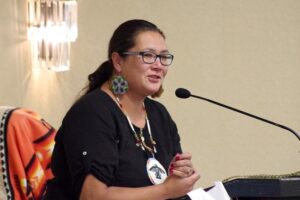Anishinabek Nation hosts research and recovery methodologies knowledge exchange gathering

By Rick Garrick
THUNDER BAY — Anishinabek Nation Grand Council Chief Linda Debassige highlighted her meetings with Indian Residential School Warriors and Survivors to kick-off the Anishinabek Nation’s Indian Residential School Research and Recovery Methodologies Knowledge Exchange gathering. Held Oct. 8-10 at the Best Western Plus NorWester Hotel and Conference Centre in Thunder Bay, the gathering also featured a variety of presentations and a mini pow wow.
“I’ve been working with [Kelsey Anger, Reconciliation Manager at Anishinabek Nation] on this file since my election this past June and I’ve had the incredible opportunity of meeting so many women, Residential School Warriors and Survivors, who have shared some of their journey with me and I’m absolutely honoured to have that experience, to have that sharing with me in order to help me do the work that I need to do,” Grand Council Chief Debassige says. “The events I’ve been to have often been heavy, but I’ve also seen that they have been very healing and remind someone like me how important this work is and how people like me in the positions we hold and the roles we carry can use our voice to really help and amplify the need for continued gatherings over time, the need to bring us together to create relationships with one another to help with our healing journey, but also to help educate young people so that we never forget the experience that our leaders, our Elders have had in Residential Schools.”
Grand Council Chief Debassige says the Anishinabek Nation will fight to continue to have Residential School gatherings, noting that they were told a couple of months ago about funding cuts that would impact events such as the Indian Residential School Research and Recovery Methodologies Knowledge Exchange gathering.
“This file is not going to be silenced, we’re not going to stand back and let anybody stop the work that we are doing,” she says. “We’re going to stand firm together and I just want to commit on behalf of the Anishinabek Nation, our Leadership Council, … that we will continue to fight so that funding does not get cut, as we have done so far.”
The first presentation during the gathering, Project Highlight: St. Joseph’s Indian Residential School Survivor’s Project, featured a video that included Fort William Councillor Yvette Greenwald speaking about her experiences as a Day School Survivor and daughter of a Residential School Survivor.
“My father was [in] Residential School in the City of Thunder Bay, I was in Indian Day School in [Fort William],” Greenwald says during the video. “When I asked my father why he didn’t teach us our language, he said, ‘No, that we’d be punished, society would not allow us to speak our language.’ So right there there was a fear that was placed over us almost immediately. I said, ‘How could the people be so mean,’ and he said, ‘It’s just the way it was, so that’s why I’m not going to teach you.’”
Kiiwetinoong MPP Sol Mamakwa also spoke about his plans to introduce a private members bill in the legislature to have Sept. 30, which is currently a federal statutory holiday, declared as a paid provincial holiday in Ontario during his Honouring Survivors – Recognize September 30th presentation.
“This past Sept. 30 was a busy day for me just because I was doing these interviews because of that story (about his private members bill) that came out that morning,” Mamakwa says. “The main question they asked me was, ‘Why are you asking for this to be a statutory holiday.’ My response was, ‘We as First Nations, we as Indian Residential School Survivors, are all the time the ones taking that day off. First Nations are the ones always trying to reconcile, it’s time for non-First Nations, non-Indigenous people to reconcile.’”

